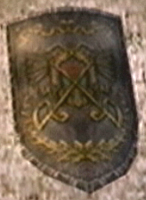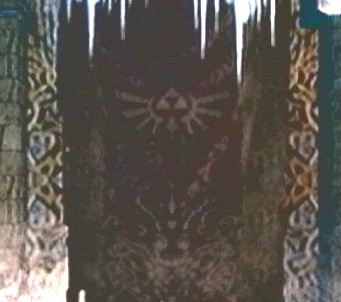The hero's shade is "the hero." Following Occam's Razor, we assume that there is only one "the hero" (besides the one that TP Link is to become) because there is no evidence or necessity for more. This hero is the Hero of Time, the only other hero to have wielded the Master Sword he seems to know so much about.
Now, all of that may seem pointless, as most people already accept this idea. But I'm going to delve deeper into these quotes (possibly too far) to learn more about what became of the Hero of Time. I'll look at the second quote first this time, specifically the second line. "I accepted life as a hero" - I'm almost certainly overanalyzing this - This sounds like a choice. The HoT didn't have much of a choice. He was told what to do. But Zelda felt bad about this and gave him to opportunity to make his own choices by sending him back in time. He must have chosen to be a hero sometime after this point. He couldn't have been referring to his journey in Termina because he didn't know the hidden skills at that point. It was during his "life as a hero" when he learned the lessons. So this life must have happened after he returned to Hyrule. This leads to the second bolded phrase of the section of my article I posted. He became the hero the people of TP remember sometime after both of the previous games. What exactly he did as a hero relates to the first bolded phrase. There was a war, though we don't have enough information to guess who it was with and what it was about.
One thing that we have to remember is that the Hero of Time still possesses all the memories and experiences he had when he went and saved Hyrule on the Adult Timeline in the events of OoT. The phrase "choosing to become the Hero" could also merely mean that he decided to warn Zelda about Ganondorf's attack on Castle Town, as that was not Zelda's specific request; her request was:
Princess Zelda said:
Now it is time for me to make up
for my mistakes...
You must lay the Master Sword to
rest and close the Door of Time...
However, by doing this, the road
between times will be closed...
Link,
give the Ocarina to me...
As a Sage, I can return you
to your original time with it.
When peace returns to Hyrule...
It will be time for us to say
good-bye...
Now, go home, Link.
Regain your lost time!
Home...
where you are supposed to be...
the way you are supposed to be...
Her original request was only for Link to close the Door of Time so that Ganondorf could not break the Triforce, and Zelda's continued emphasis on him returning to "the way he was supposed to be" implies that she wants him to return to before he became the Hero of Time, and before he truly got started on his quest to gather the Spiritual Stones. This implies that Zelda originally intended for Link to return to his childhood, to live his life as if they had never met, but it sounds like Link went above and beyond Zelda's demands and saved Castle Town by warning them of the attack. To me, this sounds what the Hero's Shade is referring to when he says he "chose to be the Hero." It implies a strong sense of nobility in Link that he would choose to save Hyrule and then Castle Town, even after he was no longer obliged to do so. This would explain all the reverence that exists for the Hero of Time on the Child Timeline, or it could merely be the fact that the exploits of the Hero of Time when he was on the Adult Timeline were shared when he returned to the Child Timeline. This does not necessarily preclude the notion that the Hero of Time went on to have further adventures on the Child Timeline after saving Termina, but it doesn't have to be necessary. At this point, by extension of Occam's Razor, there isn't a necessity to assume that there
were heroics other than those already stated, as it doesn't look like further events are eluded to on the timeline after TP.
Locke said:
He couldn't have been referring to his journey in Termina because he didn't know the hidden skills at that point. It was during his "life as a hero" when he learned the lessons. So this life must have happened after he returned to Hyrule. This leads to the second bolded phrase of the section of my article I posted. He became the hero the people of TP remember sometime after both of the previous games.
The Hero's Shade could very well be referring to his time on the Adult Timeline; remember that he is still the Hero of Time in spirit (accidentally profound phrasing), and he possesses all the memories and experiences of the Adult Timeline. He remembers every thing that he used to defeat Ganondorf (as is suggested by him remembering/re-learning many OoT melodies in MM), and the same is true for sword techniques. He doesn't necessarily have to develop "hidden sword techniques" in name by going on another adventure -- they can just be named alternatives of things he learned when he saved Hyrule on the Adult Timeline (named exclusively for gameplay purposes in TP). Again, this brings us back to the notion of "choosing to be the Hero"; rather than abandon his past (well, technically, his future :xd: -- the stuff he did on the Adult Timeline) he chose to relive the life of a Hero rather than go back to his humble beginnings in Kokiri Forest after closing the Door of Time.
The notion of revisiting his past is perhaps why OoT ends with Link returning to the courtyard where he first meets Zelda rather than in Kokiri Forest, the place of his childhood; this has a fair number of implications, the most important of which being the implication that he returned to the place where he first legitimately set out on his journey as a hero, which implies that he would make that choice again in saving Castle Town. Had he returned to Kokiri Forest rather than Hyrule Castle Courtyard, we would almost definitely assume that he chose to resume his childhood. But that notion is not entirely thrown away, as suggested by the ending of Majora's Mask, which has him returning to (what appears to be) Kokiri Forest with Skull Kid and the wood carving on the tree, which implies that he got to have some of his childhood, but still, not as he would have originally had it. Alternatively, it could be interpreted that all these events seem to separate him from his childhood, seemingly implying that he was chosen by fate to remain a hero upon making the decision to save Castle Town; perhaps his fate was sealed as the Hero because he returned with the Triforce of Courage. Its significance is often skimmed over, so perhaps this could be its true intention, that the ToC keeps him noble and heroic, and influenced his decisions to save Hyrule once again.
Now, the bit about the bloodline; another implication of the Castle Courtyard ending with Zelda is perhaps a resolution to the romantic subplot in OoT. By choosing to revisit the path of the Hero, that subsequently meant that he would have to work closer with Zelda to prevent Ganondorf's attack to come to fruition. Now, I won't go into details about what this implies, but maybe this resolves the whole "Hero's bloodline" issue as suggested by Locke's Japanese TP quotation. (How did rabid fangirlism work its way into my post? Curse you, interwebs!

) On the other hand, the phrase "My child" is very likely just the Hero's Shade addressing TP Link with a sense of seniority; regardless, the utterance of such a phrase doesn't preclude either notion one way or the other. Anyway, this ties in nicely with the whole Hero's bloodline and the choice of being the Hero again.
Now, why is it necessary that the Hero of Time dies in the second "bout" of heroism? Could he not have died merely of old age? One doesn't have to die young to remain a revered Hero in the sense that the Hero of Time was -- he could have merely aged and died an old swordsman, having been a hero in youth. In fact, that's often been the case in recent Zelda games with Sword Techniques. I see the fact that he appears as a Stalfos as merely symbolic, both in the sense that they need a physical manifestation of him to demonstrate the sword techniques, in addition to the notion that the Hero would need a "deceased" form to provide a greater, more ominous presence, similar to how Hamlet's father appears as a ghost in Hamlet; to see him physically is not entirely necessary, but it furthers the intrigue.
At any rate, I think that the "choice" is merely a reference to his achievement in preventing Ganondorf's attack; we can't be so certain yet that he was involved in any war between MM and TP.








.png/168px-Gossip_Stone_(Ocarina_of_Time_and_Majora%27s_Mask).png)
 ) On the other hand, the phrase "My child" is very likely just the Hero's Shade addressing TP Link with a sense of seniority; regardless, the utterance of such a phrase doesn't preclude either notion one way or the other. Anyway, this ties in nicely with the whole Hero's bloodline and the choice of being the Hero again.
) On the other hand, the phrase "My child" is very likely just the Hero's Shade addressing TP Link with a sense of seniority; regardless, the utterance of such a phrase doesn't preclude either notion one way or the other. Anyway, this ties in nicely with the whole Hero's bloodline and the choice of being the Hero again.